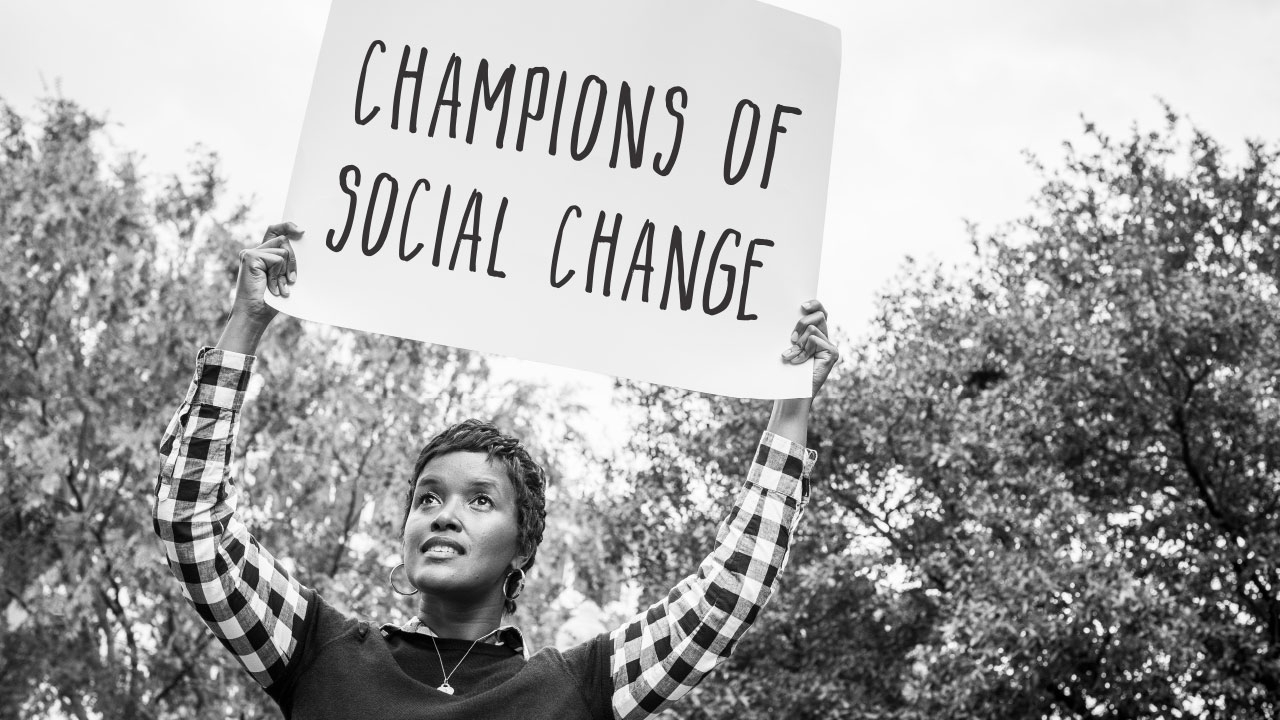Nobel Peace Laureate Leymah Gbowee once said, “The world is upside down. It’s going to take a lot of hands to turn it right side up.” In 2003, she mobilized Christian and Muslim women in her home country of Liberia to join together in a nonviolent peace movement pivotal to ending the country’s 14-year civil war.
Forty years earlier in America, peace activist Ella Baker’s leadership in the Southern Christian Leadership Conference and Student Nonviolent Coordinating Committee inspired grassroots action that shaped the course of the Civil Rights Movement.
Today, graduate student Ajanet Rountree (pictured above) is illuminating the powerful role black women play as facilitators and agents of social change by examining these two history-making movements.
“We hear about Gandhi’s influence on King, and King’s influence on Mandela,” Rountree says. “We rarely hear how Baker and [Montgomery bus boycott organizer] Jo Ann Robinson inspired Angela Davis and Betty Friedan. Women influence each other while no one is watching.”
Rountree, a student in the new master’s program in the anthropology of peace and human rights in the College of Arts and Sciences, won a National Science Foundation Graduate Research Fellowship for her studies, which shed light on the past while offering lessons for current and future social movements. “One goal is to increase the international narrative of the female experience—our social significance on cultural change and our need for human rights, specifically as an essential component in the creation and maintenance of peace,” Rountree says.
Accidental anthropologist
Born in Dayton, Ohio, Rountree grew up in cities from Birmingham to New York. She also relished opportunities to travel abroad and “study people within their culture,” she says. “I had no idea about anthropology or that I was shaping my future. I simply enjoyed the experience.” In Australia, Rountree attended a lecture by UNICEF global supply coordinator Shanelle Hall, whose passion for human rights lit a spark. “Because of her example, I came to see myself as a feminist and justice crusader, joining women fighting for liberation and equality, undeterred and undefined—carving their own path,” Rountree says. “I was no longer simply an American; I was a citizen of the world.”
At UAB, Rountree pursued an interdisciplinary undergraduate degree focusing on women, social change, and globalization. She recalls a moment when everything clicked—when Peter Verbeek, Ph.D., associate professor of anthropology, described the concept of peace ethology. “Peace is a feedback loop operating in all realms—ecologically, physically, spiritually, politically, and structurally,” Rountree explains. “Remember the song ‘Circle of Life’ from The Lion King? That is peace ethology. Everything is connected.” Following her 2016 graduation, Rountree returned to UAB, drawn by the master’s program and the newly established Institute for Human Rights.
Moving stories
Women are transformative leaders because they have the ability to bring people together and understand relationships that bridge the personal and political, Rountree says. Yet women—particularly black women—are “missing within the human rights leadership narrative, especially in nonviolent social movements. Their stories—our stories—as activists and leaders will complete the puzzle.”
The heart of Rountree’s research is a series of extensive interviews with foot soldiers of the Civil Rights Movement and Women of Liberia Mass Action for Peace, including Gbowee, who spoke at UAB in 2016. Inspired by these women, Rountree plans to pursue a Ph.D. and a career with an organization championing human rights. She’s also willing to teach. “My work allows me to speak for those who cannot speak for themselves, and humbly and passionately seek justice and mercy on their behalf,” she says. With her voice, and her hands, she’s helping to turn the world right side up.




